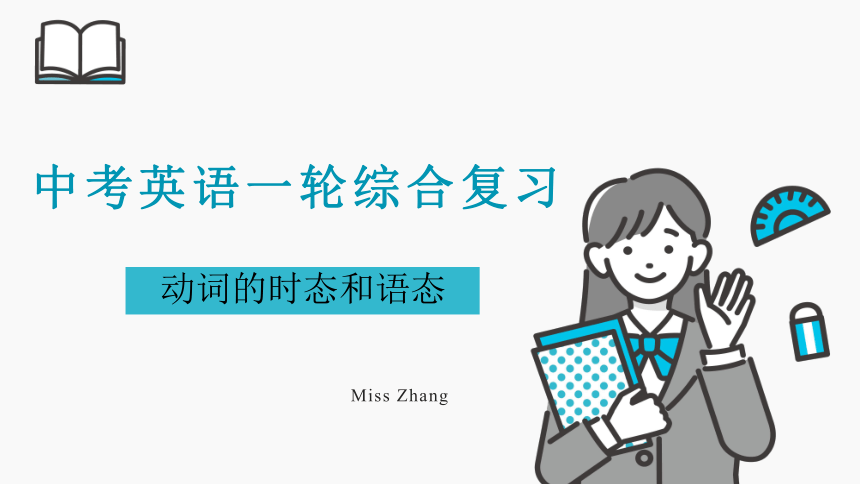(
课件网) Miss Zhang 中考英语一轮综合复习 动词的时态和语态 CONTENTS 动词的时态 被动语态 01 02 一般现在时 一般过去时 一般将来时 现在进行时 过去进行时 现在完成时 Part 1 一般现在时 1. Mi Duo has an apple every day. 2. Pride goes before a fall. It is warm in spring. 3. Tomorrow is Wednesday. 基本用法 S+be(am, is, are) 1. I am happy. 2. It is a nice day. 3. Amy and Leo are friends. 句型结构 1. He usually gets up at 7:00. 2. They come from China. S+v.(实义动词) 当主语为单三时,动词需变单三形式 -s -es y i -es all the time 一直 every day/week... 每天/周…… always 总是 once/...a week/... 每周一次/…… usually 通常 on/at weekends 在每周末 often 经常 hardly/seldom 几乎不 never 从不 时间状语 Amy and Leo are friends. Amy and Leo aren’t friends. Are Amy and Leo friends 句型转换 句中有be动词时 否定句在be动词后加not 一般疑问句把be动词提前 They come from China. They don’t come from China. Do they come from China Where do they come from 句型转换 He usually gets up at 7:00. He usually doesn’t get up at 7:00. Does he usually get up at 7:00 句中无be动词时,需加助动词(do/does) 否定句在助动词后加not 一般疑问句把助动词提前 My teacher said that the earth moves around the sun. 一般现在时从句中的应用 ①宾语从句为永恒的真理时,用一般现在时 ②时间状语从句和条件状语从句中的“主将从现” I will call on you when I go to Beijing next month. He will call me as soon as he arrives here. Part 2 一般过去时 1. He got up at 7:30 yesterday morning. 2. He was a teacher last year. 基本用法 表示过去某个时间或某段时间发生的动作或存在的状态 1. He always went to work by bus last year. 2. Tony played football every weekend when he was young. 基本用法 表示过去经常或反复发生的动作 S+be(was/were) 1. He was tired yesterday. 2. They were in Beijing last Sunday. 句型结构 1. I visited the Great Wall last summer. 2. We had breakfast at 8:00 this morning. S+v-ed(动词过去式) 动词过去的构成 yesterday (morning/afternoon/evening) 昨天(早上/下午/晚上) the day before yesterday 前天 last night/week… 上一个…… two days/…ago ……以前 just now 刚才 the other day 前几天 this morning/... 今天早上/…… in 2013/... 在……(过去的时间) 时间状语 It was excellent. It wasn’t excellent. Was it excellent 句型转换 I went to Beijing last week. I didn’t went to Beijing last week. Did you go to Beijing last week 句中有be动词时,在be动词本身发生变化; 句中无be动词时,需加助动词did 否定句在助动词后加not 一般疑问句把助动词提前 Part 3 一般将来时 1. It will be sunny tomorrow. 2. If you like, I will do it for you. 3. Will you please open the window 基本用法 (1)表示揣测和可能 (2)带有主观意愿色彩 (3)在疑问句中用来征询听话人的意图或愿望 (1)will表将来的用法 1. When shall we have the party 2. I shall write you a letter next month. 基本用法 (1)疑问句中主语为第一人称用“shall”,表建议 (2)书面语中主语为第一人称用“shall” (2)shall表将来的用法 1. I’m going to clean the room. 2. There is going to be a parent-teacher meeting this afternoon. 基本用法 表示将要发生 ... ...

